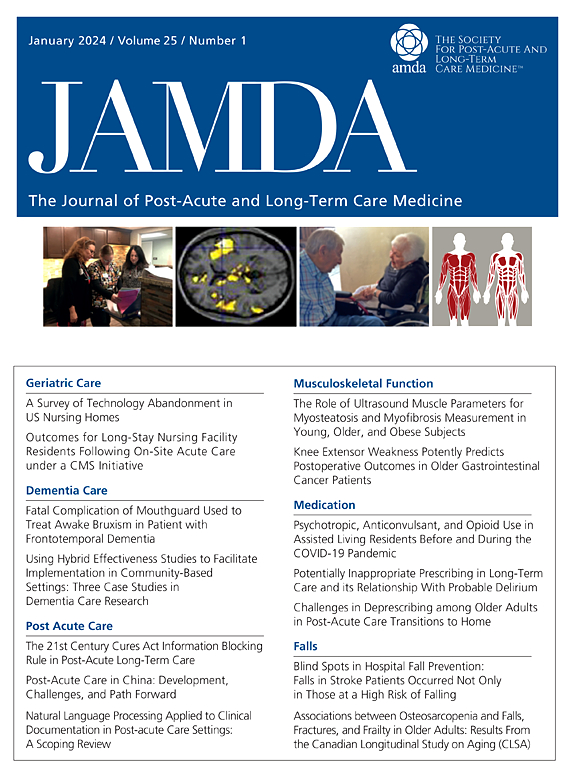双重社会心理教育对认知障碍患者及其非正式照顾者的影响:系统回顾和荟萃分析。
IF 4.2
2区 医学
Q2 GERIATRICS & GERONTOLOGY
Journal of the American Medical Directors Association
Pub Date : 2025-05-02
DOI:10.1016/j.jamda.2025.105584
引用次数: 0
摘要
目的:认知障碍给患者和护理人员都带来了沉重的负担。双重心理教育可能是一种潜在的解决方案,但其效果尚未得到系统的评估。本研究旨在评估二元社会心理教育对认知障碍成人及其非正式照顾者的结局和二元关系的影响。设计:系统回顾和荟萃分析。环境和参与者:认知障碍患者及其非正式照顾者。方法:系统检索2004年1月1日至2024年10月13日的6个电子数据库。两位研究者分别对文献进行了题目、摘要和全文的筛选。修订后的Cochrane随机试验偏倚风险工具用于评估纳入研究的偏倚风险。采用随机效应模型进行meta分析,然后进行亚组分析和敏感性分析。结果:共确定了16项研究,共2446对。没有发现对整体神经精神症状、躁动、冷漠或抑郁的影响,也没有发现对护理者的生活质量和抑郁的影响。综合结果显示,双重社会心理教育显著减少了双重冲突(SMD = -0.42, 95% CI: -0.66至-0.18,I2 = 0),而双重社会心理教育对整体认知功能(SMD = 0.12, 95% CI: -0.13至0.38,I2 = 69%)或照顾者负担(SMD = -0.20, 95% CI: -0.43至0.03,I2 = 56%)没有显著影响。然而,亚组分析表明,干预≤6个月改善了整体认知功能(SMD = 0.30, 95% CI: 0.06-0.54, I2 = 19%),减轻了照顾者负担(SMD = -0.26, 95% CI: -0.51至-0.01,I2 = 32%)。结论与启示:这些研究结果表明,二元心理教育可以减少二元冲突。干预对认知功能和照顾者负担也有改善作用,但干预时间对效果有影响。考虑到结果的不稳定性,本研究的结果需要谨慎解释。本文章由计算机程序翻译,如有差异,请以英文原文为准。
Effects of Dyadic Psychosocial Education on People Living with Cognitive Impairment and Their Informal Caregivers: A Systematic Review and Meta-Analysis
Objectives
Cognitive impairment places a substantial burden on both patients and caregivers. Dyadic psychosocial education may be a potential solution, but its effects have not been systematically evaluated. This study aimed to evaluate the effects of dyadic psychosocial education on outcomes and dyadic relationships among cognitively impaired adults and their informal caregivers.
Design
Systematic review and meta-analysis.
Settings and Participants
People living with cognitive impairment and their informal caregivers.
Methods
Six electronic databases were systematically searched from January 1, 2004, to October 13, 2024. Two researchers independently screened the literature by title, abstract, and full text. The revised Cochrane risk-of-bias tool for randomized trials was used to assess the risk of bias for included studies. A meta-analysis was performed using a random effects model, followed by subgroup and sensitivity analyses.
Results
Sixteen studies representing 2446 dyads were identified. No effects were found on overall neuropsychiatric symptoms, agitation, apathy, or depression, nor caregiver quality of life and depression. Pooled results showed dyadic psychosocial education significantly reduced dyadic conflict (SMD = −0.42, 95% CI: −0.66 to −0.18, I2 = 0). No significant effects of dyadic psychosocial education were found on overall cognitive function (SMD = 0.12, 95% CI: −0.13 to 0.38, I2 = 69%) or caregiver burden (SMD = −0.20, 95% CI: −0.43 to 0.03, I2 = 56%). However, subgroup analyses indicated that interventions ≤6 months improved overall cognitive function (SMD = 0.30, 95% CI: 0.06-0.54, I2 = 19%) and reduced caregiver burden (SMD = −0.26, 95% CI: −0.51 to −0.01, I2 = 32%).
Conclusions and Implications
These findings demonstrate that dyadic psychosocial education can reduce dyadic conflict. The intervention also benefited cognitive function and caregiver burden, but the intervention duration influenced the effectiveness. Given the instability of the results, the findings of this study need to be interpreted with caution.
求助全文
通过发布文献求助,成功后即可免费获取论文全文。
去求助
来源期刊
CiteScore
11.10
自引率
6.60%
发文量
472
审稿时长
44 days
期刊介绍:
JAMDA, the official journal of AMDA - The Society for Post-Acute and Long-Term Care Medicine, is a leading peer-reviewed publication that offers practical information and research geared towards healthcare professionals in the post-acute and long-term care fields. It is also a valuable resource for policy-makers, organizational leaders, educators, and advocates.
The journal provides essential information for various healthcare professionals such as medical directors, attending physicians, nurses, consultant pharmacists, geriatric psychiatrists, nurse practitioners, physician assistants, physical and occupational therapists, social workers, and others involved in providing, overseeing, and promoting quality

 求助内容:
求助内容: 应助结果提醒方式:
应助结果提醒方式:


